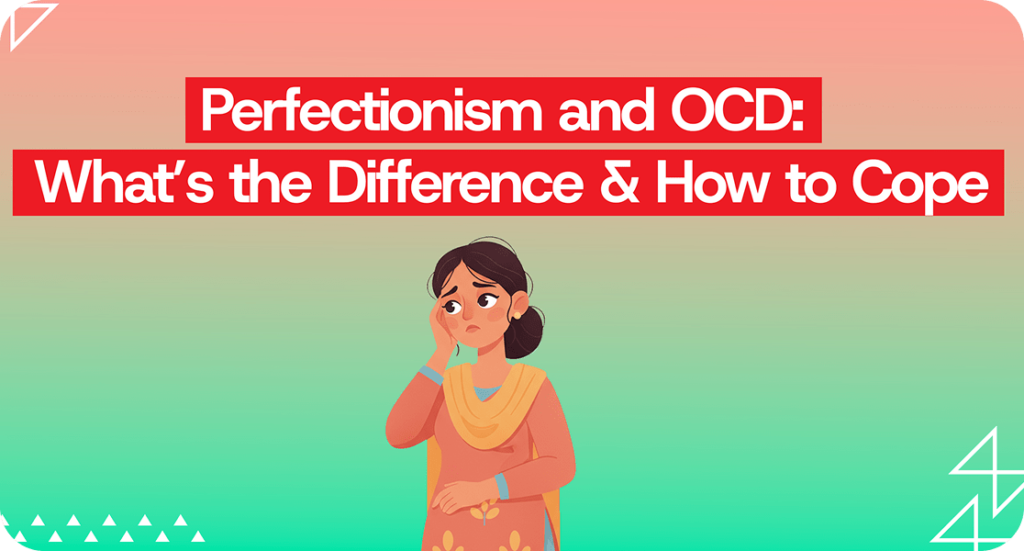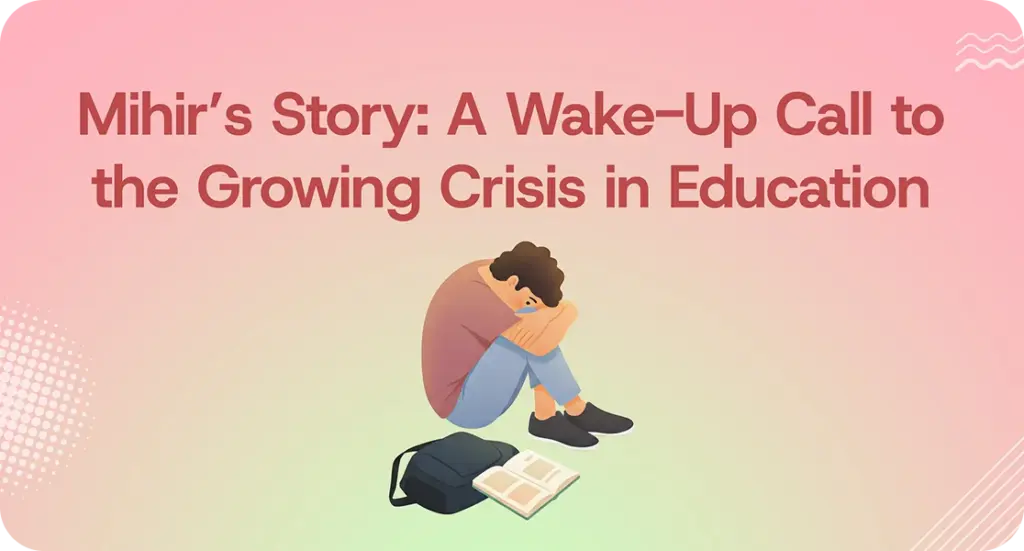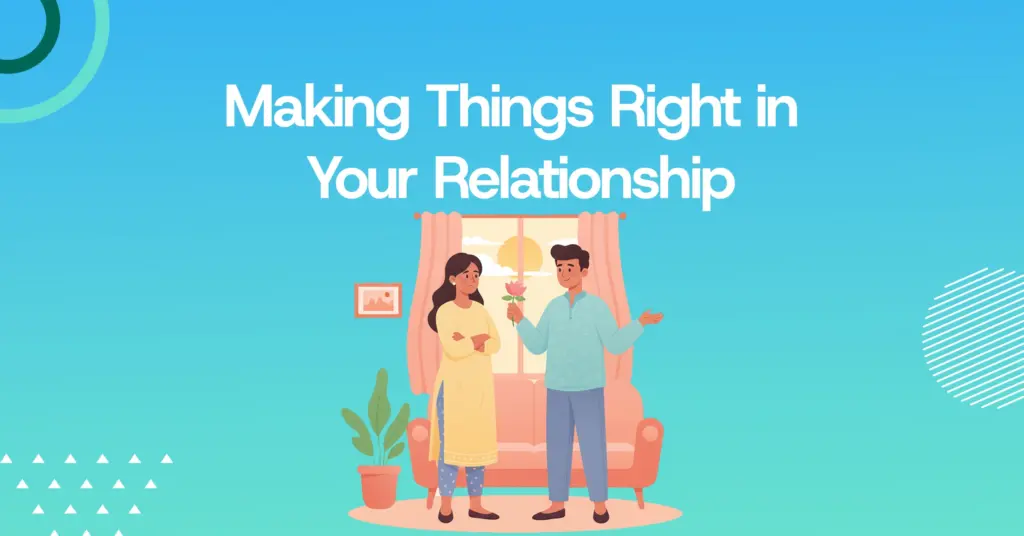
How to apologize in a relationship Kerala is one of the most important skills you can develop for emotional connection and long-term trust. Relationships are built on communication, understanding, and empathy — but even the strongest bonds face turbulence. Arguments and emotional wounds are natural. What truly matters is how you handle them, especially how you apologize and rebuild connection.
In this guide, we’ll walk you through powerful strategies to sincerely apologize, repair emotional damage, and rebuild trust with your partner. These are not just tips; they’re tools for long-term relationship health.
Need to Talk to Someone?
Book a private online session with a licensed therapist
Why Saying ‘I’m Sorry’ Matters in a Relationship / How to Apologize ?
Every couple is different, but conflict is universal. Disagreements, big or small, can either damage your relationship or deepen your connection — depending on how you respond. Couples counselling online Kerala
A sincere apology can:
- De-escalate tension and restore calm
- Acknowledge emotional hurt and validate your partner’s feelings
- Lay the groundwork for healing and moving forward
6 Steps on How to Apologize in a Relationship Kerala
- Acknowledge your mistake: Own what happened — don’t deflect or minimize.
- Use “I” statements: Say “I was wrong” or “I hurt you” instead of blaming.
- Listen actively: Allow your partner to express how they feel without interruption.
- Validate emotions: Empathize with their pain and show you understand their perspective.
- Make amends: Ask what you can do to make it right.
- Follow through: Commit to real change — and mean it.
Try These Apology Phrases:
- “I’m deeply sorry for my actions.”
- “I hurt you, and I promise to be better.”
- “Can you forgive me?”
Saying sorry isn’t always easy — especially in close relationships where emotions run deep. If you’re unsure how to apologise to your partner in Kerala, professional support can make the process smoother and more meaningful. Through Oppam’s online couples counselling, Malayali partners can learn effective communication and relationship apology tips that rebuild trust and emotional connection. Whether you’re dealing with misunderstandings, long-distance strain, or family pressure, Oppam’s No. 1 Kerala-based therapists guide you step-by-step toward healthy conversations and lasting healing.
When Apology Isn’t Enough – What Couples in Kerala Should Do
Healing after a disagreement isn’t just about saying sorry — it’s about working together to rebuild trust.
Many couples in Kerala face unique challenges that quietly test their relationships. For some, the communication gap caused by Gulf jobs leads to long silences and misunderstandings that words over the phone can’t fix. Others struggle with family and cultural pressure — where pride or tradition makes it harder to say “I’m sorry.” In multilingual households, where one partner expresses emotions in Malayalam and the other in English, even a simple apology can be misunderstood. Recognizing these realities helps couples approach each other with more empathy and choose the right words to heal, not hurt.
Example Apology Script for Kerala Couples:
“I’m really sorry for not calling you when I was late from work last Sunday. I know it made you feel worried and alone. I didn’t mean to ignore your feelings — I just got caught up in things. Next time, I’ll make sure to keep you informed. You mean a lot to me, and I don’t want small things to hurt what we have.”
“I’m really sorry for not calling you when I was late from work last Sunday. I know it made you feel worried and alone. I didn’t mean to ignore your feelings — I just got caught up in things. Next time, I’ll make sure to keep you informed. You mean a lot to me, and I don’t want small things to hurt what we have.”
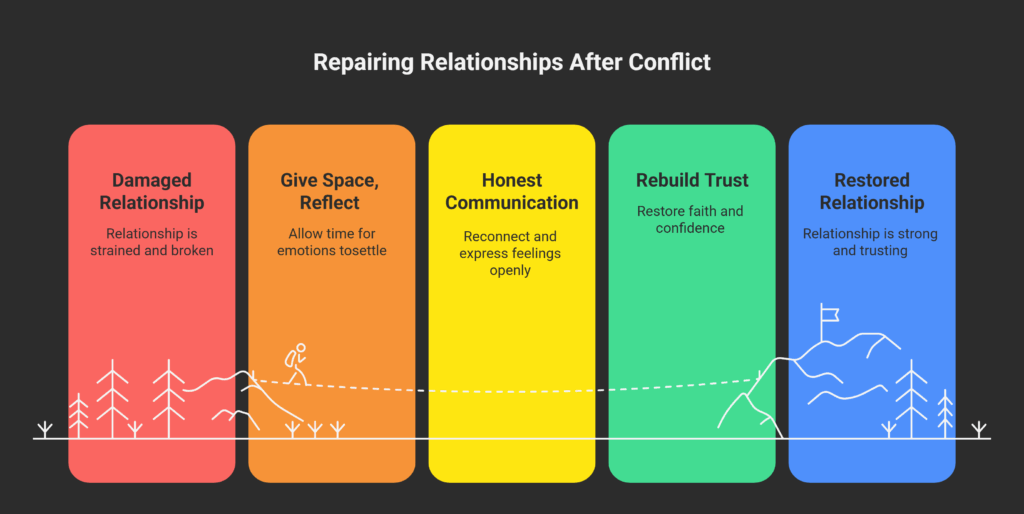
Step 1: Give Space, Then Reflect
- Take time to cool down.
- Reflect on what triggered the argument and your role in it.
Step 2: Reconnect Through Honest Communication
- Use calm, open conversations to explore what went wrong.
- Apologize sincerely and ask for forgiveness.
- Validate each other’s perspectives without judgment.
Step 3: Rebuild Trust
- Intify recurring triggers and work to resolve them.
- Reaffirm love, commitment, and a willingness to improve.
- Be reliable and consistent moving forward.
Best Ways to Say Sorry to Your Partner
Sincere Apologies
- “I take full responsibility for hurting you.”
- “I love you, and I deeply regret my actions.”
Personalised Apologies
- “You deserve better, and I’m working on myself for you.”
- “I’m sorry for letting you down.”
Action-Oriented Apologies
- “What can I do to make this right?”
- “Let’s find a solution together.”
Heartfelt Apologies
- “You mean the world to me. I hate that I hurt you.”
- “I’m committed to growing and being a better partner.”
How to Repair Emotional Hurt in Relationships
In Kerala’s fast-paced lifestyle, misunderstandings between partners often begin with the smallest things — a missed call during a hectic Onam celebration, an argument after a long day at work, or the emotional distance that creeps in when one partner works in the Gulf. These everyday pressures can quietly strain even the strongest relationships. Learning how to apologise to your partner in Kerala the right way can heal those silent gaps. With the right relationship apology tips for Malayalis, a simple “I’m sorry” can turn into a bridge that rebuilds love, respect, and understanding.
Communication tips for Malayali couples ,Emotional wounds need more than time — they need intention.
- Acknowledge the Hurt
- Let your partner express their feelings freely.
- Avoid defensiveness — just listen and validate.
- Take Full Responsibility
- Own your role in the conflict.
- Provide context without making excuses.
- Begin the Healing Process
- Be honest, patient, and consistent.
- Rebuild trust with daily actions — not just words.
- Reconnect and Move Forward
- Invest time in shared activities.
- Show empathy and emotional presence.
- Talk openly about how to prevent future hurts.
How to Rebuild Trust After a Fight
Rebuilding trust is a marathon, not a sprint. Here’s how to stay the course: Online couples counselling Kerala helps
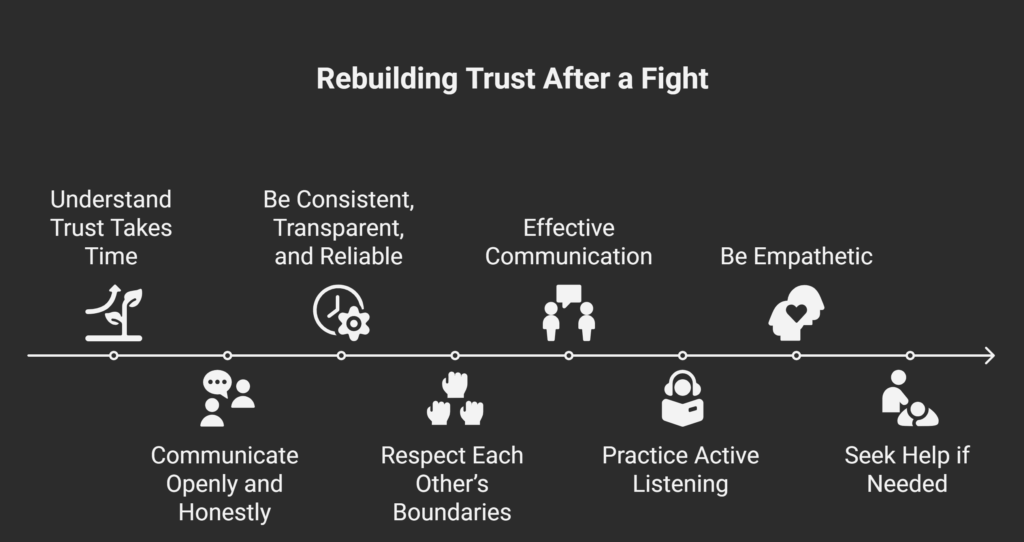
Trust-Building Checklist:
- Understand that trust takes time
- Communicate openly and honestly
- Be consistent, transparent, and reliable
- Respect each other’s boundaries
You may have meant well, but one wrong word or an ignored call can easily hurt someone you love. In relationships, even small misunderstandings can create distance that feels hard to bridge — especially in Kerala’s busy, emotionally connected lifestyle. The good news is that an honest apology can heal what words once broke. This guide will show you how to apologise effectively, rebuild trust, and strengthen emotional bonds using relationship apology tips for Malayalis that truly work.
Additional Trust-Boosting Habits:
- Effective Communication: Stay calm, clear, and non-defensive.
- Set Boundaries: Maintain individual space and mutual respect.
- Practice Active Listening: Show that you care by truly understanding.
- Be Empathetic: Feel your partner’s pain, not just acknowledge it.
- Seek Help if Needed: Consider couples therapy for structured support.
Feeling Overwhelmed?
You’re Not Alone. Get Support from an
Oppam Therapist Wherever You Are
Oppam Therapist Wherever You Are
Sometimes, professional guidance is necessary to break toxic patterns and move forward in a healthy way.
Benefits of Couples Therapy:
- Learn better communication and conflict resolution
- Heal unresolved emotional wounds
- Rebuild intimacy and trust
- Gain perspective and clarity from an expert
Final Thoughts
Arguments happen. Emotional pain is real. But with empathy, communication, and the willingness to change — love can not only survive, but grow stronger.
A sincere apology is your first step. The next is daily action.
Consider online couples counselling with Oppam. Take the first step to reconnect and rebuild your relationship. Ready to rebuild your connection? Book online couples counselling with Oppam in Kerala today.
Struggling?
Talk to an Oppam Therapist
Get the Support You Deserve Online & Confidential
